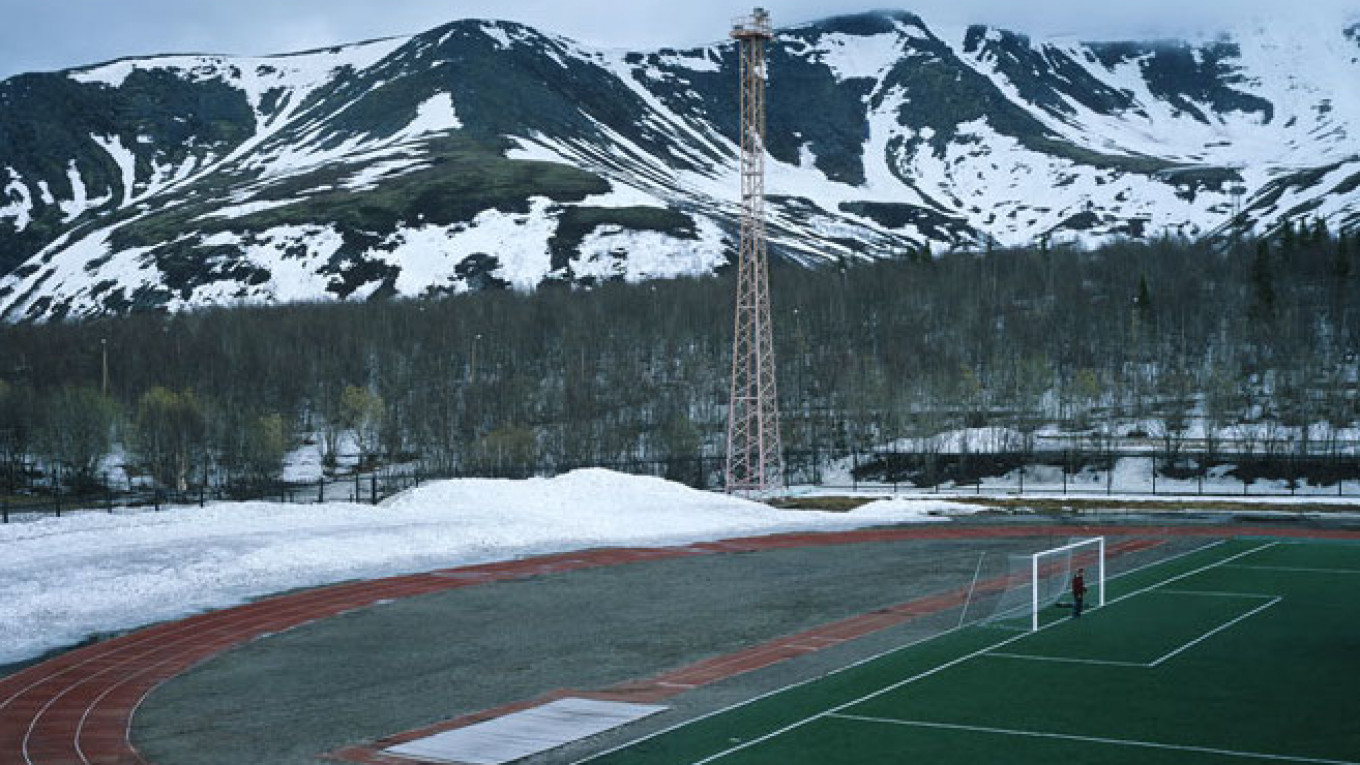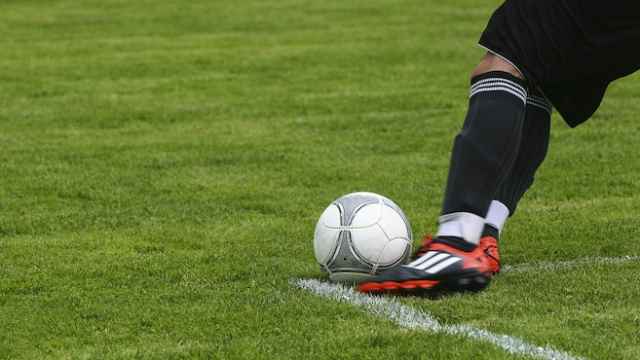SEMYONOV, Nizhny Novgorod region — Beating on drums and chanting loudly, two dozen supporters of FC Semyonov football club march across their local team's pitch and take their places in the stands. A smattering of families, teenagers and pensioners make up the rest of the 150-strong crowd in this small town five hours train ride from Moscow.
Down on the pitch, photographer Sergey Novikov is instructing the 11 local players how to stand as he takes a pre-match shot before the game against FC Spartak Tumbotino.
The photo that Novikov takes, as well as other shots from the game, are part of his Grassroots project, which has seen the 35-year-old spend the past three years traveling around central and western Russia to photograph amateur football teams and their stadiums. On his journey, he has been asked to take to the pitch himself after a player fell ill and has visited matches in top secret closed cities in the Far North.
Focusing as much on what lies beyond the pitch as who is playing on it, Grassroots is more than just a collection of sports photographs. From the grass-shy pitches in the north to fields in central Russia surrounded by churches, Novikov's project offers a glimpse into life in the Russian regions.
Beyond the Pitch
"For me it is always interesting to look at what surrounds the stadium: how does it fit into the urban landscape?" Novikov says. "The stadiums in the Tver region are often surrounded by concrete blocks. In the village of Pryazha in the Karelia region, they built a wooden fence around the pitch as if it was an ancient fortress."
Novikov hails from Cheboksary but now works in Moscow as a photo editor for culture news site Colta.ru. He devotes much of his spare time to Grassroots, funding the project out of his own pocket. "The problem is when … you have to travel really far for one photo, it's very expensive," he says. In order to make the trips worthwhile, he tries to attend two or three games in the same area over a weekend.
Given the amateur status of the teams that he photographs, Novikov's plans are prone to disruption. He recalls traveling to the northern town of Kirovsk in the Murmansk region when he found out the match had been canceled. A day of mourning had been declared after more than a dozen local officials were killed in a helicopter crash.
Plans to watch another team in the Nizhny Novgorod region also fell through after the club — FC Ruslan, named after a character in Alexander Pushkin's poem "Ruslan and Lyudmila" — withdrew from the match citing financial reasons. Novikov says problems with money are the main reason for cancellations.
To find clubs willing to take part in his project, Novikov scrolls through fixtures on the websites of regional championship federations and then contacts them via the VKontakte social media site. It took him weeks of planning to visit two closed towns — Snezhnogorsk and Polyarny in the Murmansk region — and was accompanied by minders both to and from the games.
Photographer Sergey Novikov at the match between FC Semyonov and FC Spartak Tumbotino.
On to Siberia for 2018
Grassroots is still a work in progress, and Novikov says he wants to extend his project eastward beyond the Ural Mountains and into Siberia. His aim is to complete the project by 2018, when Russia will host the FIFA football World Cup.
Grassroots is not Novikov's first football-inspired project. A previous series called FC Volga United saw him photograph amateur and professional clubs dotted along the banks of the Volga River. It was during this time that Novikov realized "how diverse the footballing landscape of the country was and decided to do Grassroots to document the more unique and interesting pitches across Russia."
The stadium in Semyonov comprises one stand overlooking a synthetic pitch that is dotted with sand-filled holes. Behind the stand lies a copse of birch trees, where several cows are grazing. A herd of cows once almost wandered onto the pitch at another match, said Novikov.
After photographing the players, Novikov heads to the stand to watch the first half. He always shoots the team before the game because after the match the weather — or the players' moods — might change. Teams usually respond well to having their photo taken, but Novikov notes the players often act very seriously. "Sometimes when I do a group photo, I feel like adding a bit of irony … so if someone not connected to the team comes into the frame, I'm for this."
Flares, Police and Retired KGB
No sooner has the day's game kicked off than the group of raucous FC Semyonov fans let off a flare, prompting five or so policemen to march over and stand provocatively in front of them.
"That will be a 3,000 ruble [$57] fine," says a middle-aged man dressed in a suit and with glasses perched on the end of his nose as he saunters over, marking the violation down on his clip pad. It turns out that he is a match inspector from the regional football federation. The fine is for the club and not the spectators. He spends the rest of the game lurking around for possible infractions. Later on the train out of the town, he can be heard complaining about some of the more obscene language used by the fans.
At least one police car and a medical officer are obliged to attend every football match organized through football federations, said Novikov, pointing out the designated doctor for today's game — a middle-aged woman wearing three-inch wedges and a nurse's apron underneath her coat.
See the gallery: A Fascinating Glimpse at Russia's Amateur Football Pitches
With FC Semyonov two goals down at halftime, a couple of elderly fans accuse this reporter of using the match as a cover to write about the Ukraine crisis. The men only warmed up when it was established that everyone, including the sole English person present, had heard of Winston Churchill, prompting one of them to produce a newspaper cutting from May 10, 1945 — the day after Allied forces marked the defeat of Nazi Germany. The men later reveal that they used to work for the KGB, the Soviet secret police.
As the second half kicked off, Novikov returned to his spot in the stand. In the 70th minute, one of the home players punched an opponent in the face and is sent off. The same side's goalkeeper is ordered off 10 minutes later after he flattened an attacking player just outside the penalty box.
Sergey Novikov's Top 5 Stadiums in Russia:
- Gornyak Stadium — Kirovsk, Murmansk region
- Vodnik Stadium — Tuapse, Krasnodar region
- Lesotekhnikuma Stadium — Totma, Vologda region
- Yupiter Stadium — Valdai, Novgorod region
- Pryazha Stadium — Pryazha, Karelia republic
Semyonov did eventually pull a goal back, but a 45-yard lob sealed the win for Spartak Tumbotino, who won the match 3-1. The two dozen hardcore Semyonov fans left about five minutes before the end of the match, releasing several flares outside the stadium gates as they went.
Asked why Russian supporters should shun professional clubs in order to watch amateur teams, Novikov noted that Grassroots matches say a lot about real life and that "so many interesting things happen." He also highlights the role that football pitches play in the local community.
"Stadiums are especially important in provincial towns because they are often the only place that members of the local population can let off some steam. When everything is going badly at work, when you face chaos and corruption in your town, when your wife leaves you for another man then you have two options: sport or alcohol."
To find out more about Grassroots or the author's other projects, visit Sergey Novikov Photography.
A Message from The Moscow Times:
Dear readers,
We are facing unprecedented challenges. Russia's Prosecutor General's Office has designated The Moscow Times as an "undesirable" organization, criminalizing our work and putting our staff at risk of prosecution. This follows our earlier unjust labeling as a "foreign agent."
These actions are direct attempts to silence independent journalism in Russia. The authorities claim our work "discredits the decisions of the Russian leadership." We see things differently: we strive to provide accurate, unbiased reporting on Russia.
We, the journalists of The Moscow Times, refuse to be silenced. But to continue our work, we need your help.
Your support, no matter how small, makes a world of difference. If you can, please support us monthly starting from just $2. It's quick to set up, and every contribution makes a significant impact.
By supporting The Moscow Times, you're defending open, independent journalism in the face of repression. Thank you for standing with us.
Remind me later.






